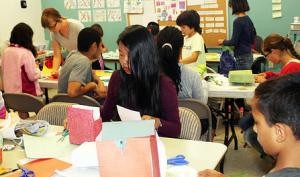Young Outliers is a summer program for kids where the classroom meets the real world. Here is an interview with the CEO and Founder, Gigi Carunungan.
Young Outliers Official Website: http://www.YoungOutliers.com
1) How did you come up with Young Outliers?
The middle school segment of the American education system has a lot of problems. Mainly students are experiencing bullying and they are not happy going to school. Yet in “Outliers” the book, Gladwell explains that Outliers that have early success in life are those that started practicing their passions in middle school.
For the most, it is not those that have the highest IQ scores that succeed. When these outliers reached 10,000 hours of practice they were ahead of the game. I want to offer students in this age group the opportunity to discover and start practicing their passions and develop their potential to become future outliers.
2) When I looked at your website, I noticed some really interesting programs offered like: Design Song, Design Sci-Fi, Design World, etc. How and why did you design these programs in particular?
Education has mostly been so detached from the real world. We learn long division for example for a whole quarter and then we don’t know how to apply this to real world math. Schools tend to be more focused on the steps and make sure we get the correct answer and not in how this is used in the real world, most especially, when people use calculators to work on complex problems.
At Young Outliers, we connect academic, to design and entrepreneurship. Out goal is to immerse students in exciting, hands-on, and relevant learning activities so they see these connections. Students explore ideas, build a team, design and build a product and upload to the marketplace. When their product sell, they get a check in the mail. They experience learning like it was the real world.
3) What has been the response to your workshops by the children and parents so far?
The children who have participated in our camps and parents enjoyed and have been inspired by the learning experiences. It is a challenge to parents who have just heard about the camps to convince their children about our offerings. After all, we are a very different camp.
4) How are these workshops impacting the children participating? Would you be able to tell me some interesting, striking experiences with the children that comes to mind?
Those that attended last summer find they are more successful in school. There was one student who was always struggling in his classes and after last summer, his mom was surprised to see his grades go up. I think what matters is that learning at Young Outliers makes sense to the participants.
Since we include academics in our offerings, then they are also able to make sense of what they are learning at school. More importantly, students discover and form their unique voices. They learn to connect their personal passions with learning.
5) What is the overall message and purpose for those who join Young Outliers?
“The middle grade years have sometimes been called the “Bermuda Triangle of K-12 education, because too often they’re a time where students “sink or swim.” – U.S. Education Secretary Arne Duncan
“During the ages of 9-13, learning habits are formed from which we can predict whether or not a student graduates, making it a critical “make or break” period. It is in this period when students are highly sensitive, asking questions such as “Who am I?” “How do I fit in?” “What makes me special?’” – Robert Balfanz, Senior Research Scientist John Hopkins University
“The conditions students face and how they perform in middle school play a vital role in whether or not they will graduate from high school prepared for college and the 21st century workforce. Students who fail one middle school class are much more likely to drop out of high school.” – Youth Transition Task Force, 2006
As parents, it is critical that we value early exposure and constant practice with design and entrepreneurship as guideposts of learning–twin engines that power the economy and our children’s future. At Young Outliers, we have reinvented education with the understanding of how children learn best– hands-on, connected, purposeful, context-based, and actively engaged in a nurturing and socially-interactive environment.
In the Young Outliers courses and events, children ages 8-13 apply and cross-pollinate creative ideas and practice effective communications and perseverance in problem-solving.
6) What are the upcoming plans for Young Outliers? What can we look forward to?
We have just launched a backpack design competition for this age group. Please check this out at http://www.youngoutliers.com. And for those who haven’t completed their summer camp plans, check out what we have to offer.
What are your thoughts on this post? Please share with me in the comments! * This blog post appeared originally on My Pure Intuition


Leave a Reply